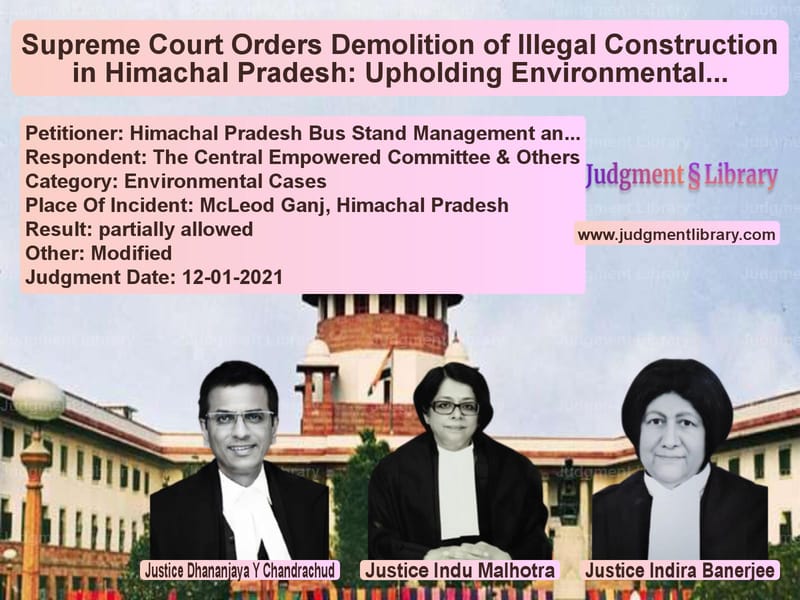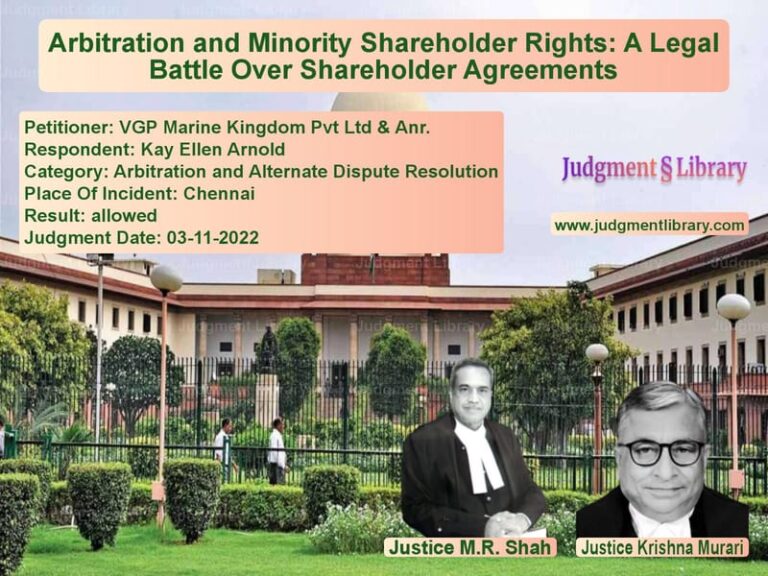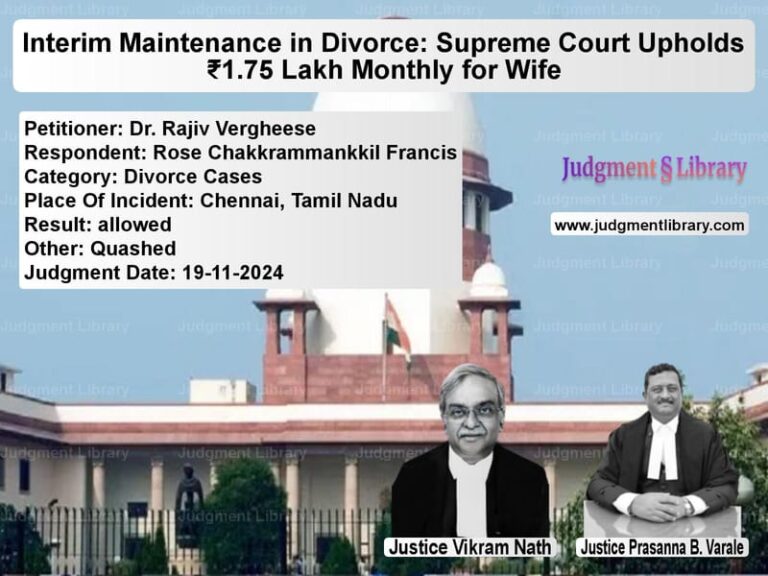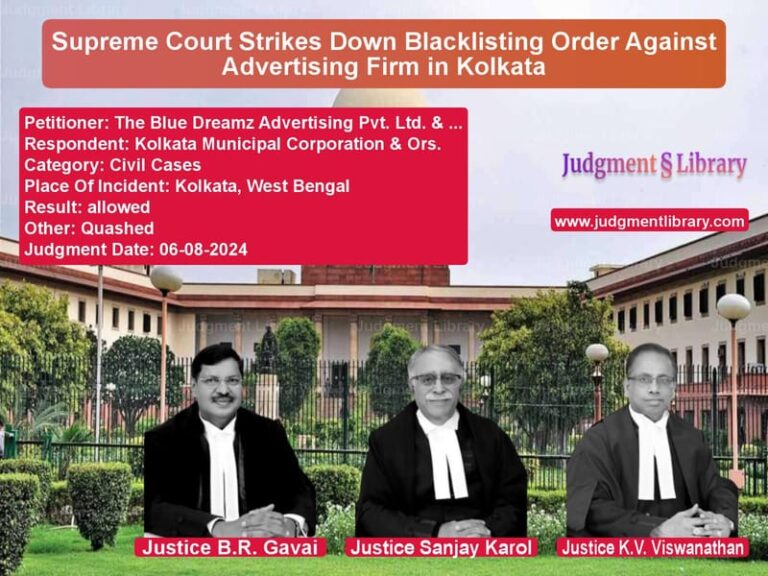Supreme Court Orders Demolition of Illegal Construction in Himachal Pradesh: Upholding Environmental Rule of Law
The Supreme Court of India recently delivered a landmark judgment in Himachal Pradesh Bus Stand Management and Development Authority (HPBSM&DA) vs. The Central Empowered Committee & Others, which addresses a critical issue related to environmental governance and the illegal use of forest land for commercial purposes. The case revolved around the unauthorized construction of a Hotel-cum-Restaurant within the Bus Stand Complex in McLeod Ganj, Himachal Pradesh, in violation of the Forest (Conservation) Act, 1980.
The Court, upholding the findings of the National Green Tribunal (NGT), ordered the demolition of the unauthorized structure and directed action against the erring government officials responsible for the illegal project. The judgment emphasizes the role of courts in ensuring environmental justice and affirms that economic gains cannot justify violations of environmental laws.
Background of the Case
The case arose from appeals challenging the NGT’s decision dated May 4, 2016, which found that the Bus Stand Complex in McLeod Ganj was constructed in violation of environmental norms. The NGT accepted the report of the Central Empowered Committee (CEC), which concluded that portions of the Bus Stand Complex, particularly the Hotel-cum-Restaurant, had been built illegally on reserved forest land.
The Supreme Court had earlier stayed certain aspects of the NGT’s order, including the demolition directive. However, as the case proceeded, it became evident that the construction was a blatant violation of forest laws, leading to the final verdict upholding the demolition order.
Key Legal Issues Addressed
1. Unauthorized Construction on Forest Land
The primary issue in the case was whether the construction of the Hotel-cum-Restaurant was legally permissible. The Bus Stand Complex was originally sanctioned for parking and transport facilities, and the Ministry of Environment and Forests (MoEF) had granted approval only for these purposes.
The Supreme Court noted:
“The permission granted by MoEF on 12 November 1997 was only for the construction of a ‘parking place’ at McLeod Ganj. Similarly, the permission granted on 1 March 2001 was for the construction of a ‘bus stand’. At no point was any permission granted for the construction of a hotel or commercial structure.”
Thus, the construction of the Hotel-cum-Restaurant was found to be in complete violation of the Forest Act, making it illegal.
2. Violation of the Environmental Rule of Law
The Court emphasized the importance of adhering to the environmental rule of law, which ensures that all activities impacting the environment comply with legal and regulatory frameworks. The Court stated:
“A lack of scientific certainty is no ground to imperil the environment. The environmental rule of law must be upheld to protect ecologically sensitive areas.”
The Court reiterated that judicial intervention is necessary to prevent environmental degradation and that regulatory frameworks must be strictly enforced.
3. Role of the National Green Tribunal (NGT)
The Supreme Court affirmed the jurisdiction of the NGT in adjudicating environmental disputes, stating:
“Environmental governance is founded on the rule of law and emerges from the values of our Constitution. The NGT plays a crucial role in ensuring that environmental laws are not violated under the pretext of economic development.”
Findings of the Court
1. Violations of Environmental Laws
The Supreme Court found that the HPBSM&DA and the private construction company (M/s Prashanti Surya Construction Company) engaged in unauthorized construction activities in clear violation of environmental laws. The Court noted that the officials responsible for approving the project acted in connivance with private developers.
2. Accountability of Government Officials
The Court held multiple government departments accountable for their role in allowing the illegal construction, including:
- The Himachal Pradesh Tourism Department
- The Town and Country Planning Department
- The Forest Department
- The Municipal Corporation
- The Electricity Department
The judgment directed the Himachal Pradesh government to take action against erring officials.
3. Rejection of Post-Facto Approvals
The State of Himachal Pradesh had sought retrospective approval for the construction. However, the MoEF rejected this request. The Supreme Court upheld this decision, stating:
“Post-facto approvals cannot be used as a means to regularize illegal activities. The law must take its course, and unauthorized constructions must be demolished.”
Supreme Court’s Verdict
The Supreme Court upheld the NGT’s ruling and issued the following directives:
- Demolition of the Hotel-cum-Restaurant: The unauthorized structure must be demolished within two months.
- Financial Penalties: The second respondent (private builder) was directed to bear the demolition costs.
- Limited Use of the Remaining Complex: The bus stand and parking facility may be used strictly for their originally intended purposes.
The Court warned against any future violations and reaffirmed that public projects must comply with all environmental regulations.
Conclusion
The Supreme Court’s judgment in this case sets a crucial precedent for environmental governance in India. It reiterates that:
- Economic interests cannot override environmental laws.
- Government officials must be held accountable for allowing illegal constructions.
- Post-facto approvals should not be used as a tool to bypass legal scrutiny.
- The NGT plays a vital role in enforcing environmental regulations.
By upholding the environmental rule of law, the judgment ensures that unauthorized encroachments on forest land are dealt with strictly, thereby preserving India’s fragile ecosystems for future generations.
Petitioner Name: Himachal Pradesh Bus Stand Management and Development Authority (HPBSM&DA).Respondent Name: The Central Empowered Committee & Others.Judgment By: Justice Dhananjaya Y Chandrachud, Justice Indu Malhotra, Justice Indira Banerjee.Place Of Incident: McLeod Ganj, Himachal Pradesh.Judgment Date: 12-01-2021.
Don’t miss out on the full details! Download the complete judgment in PDF format below and gain valuable insights instantly!
Download Judgment: himachal-pradesh-bus-vs-the-central-empowere-supreme-court-of-india-judgment-dated-12-01-2021.pdf
Directly Download Judgment: Directly download this Judgment
See all petitions in Environmental Cases
See all petitions in Judgment by Dhananjaya Y Chandrachud
See all petitions in Judgment by Indu Malhotra
See all petitions in Judgment by Indira Banerjee
See all petitions in partially allowed
See all petitions in Modified
See all petitions in supreme court of India judgments January 2021
See all petitions in 2021 judgments
See all posts in Environmental Cases Category
See all allowed petitions in Environmental Cases Category
See all Dismissed petitions in Environmental Cases Category
See all partially allowed petitions in Environmental Cases Category







